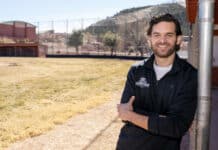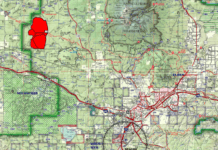The Tucson-based Center for Biological Diversity said it plans to sue the U.S. Forest Service in the coming weeks for not doing enough to keep errant livestock out of the streamside cottonwood-willow forests of the Verde River watershed.
The riparian areas provide habit for more than a dozen endangered species in the region, and the group alleges that cows are busting out of authorized pastures frequently enough to cause “significant” damage to 51.5 miles, or 36%, of the Verde’s streamside habitat and, in some stretches of river, establish wild herds. Impacts claimed by CBD include cow pies in or near water, trampled river banks, networks of cow trails and “overgrazed woody and herbaceous vegetation.”
The Verde is one of two rivers in Arizona with a “Wild and Scenic” designation under the Wild and Scenic Rivers Act of 1968, which grants protections to rivers deemed to have “outstanding natural, cultural, and recreational values in a freeflowing condition.”
Though limited numbers of cows have legal run over most of local national forests, by USFS policy — and a 1998 agreement with CBD — livestock are supposed to be fenced out of the riparian areas, with a few exceptions.
The Southwestern Region’s comprehensive management plan for the Verde River states, “Livestock grazing shall be excluded from Verde River riparian habitat,” and “the river corridor should be inspected regularly when livestock are in adjacent pastures to ensure livestock are not in riparian areas.”

But keeping cows out is not easy. They are drawn, like the Verde’s two-legged inhabitants, to the river bank’s shade, water and abundant forage, including cottonwood and willow saplings.
The habitat damage alleged by CBD is concentrated in the most rugged and remote sections of the river, where routine inspections and maintenance are challenging.
In a March notice of intent to sue the USFS — a step required for suits under the Endangered Species Act — CBD alleged that USFS is not doing enough to keep cows out of the river. Last year the group surveyed 143 miles of stream in the Verde watershed for signs of livestock and compiled its findings in a report, “Ravaged River.”
The group demanded that the forest immediately remove unauthorized cattle currently in the Verde’s cottonwoodwillow forests, inspect and repair fencing protecting the river, and cancel grazing permits for “habitually noncompliant” grazing permit holders.
“There were several years, in the early 2000s, where the agencies, fresh off of the [1998] lawsuit and settlement, took their responsibility very seriously to keep cows off the river,” said Joe Trudeau, Southwest conservation advocate for the Center for Biological Diversity. “But in recent years, in the last five or 10 years, things have really taken a turn for the worse. That’s what triggered us to have to take action again.”
Forest Responds
In a May 19 letter of response to the environmental group, USFS’s Southwestern Region office in Albuquerque acknowledged that unauthorized cattle are using some parts of the Verde River and connected streams on national forest land.
But USFS also claimed that it has been conducting inspections of the river and working with grazing permit holders to keep cows out of the riparian habitats.
The USFS promised to “continue to conduct periodic checks for livestock in [the] riparian corridor” and noted additional measures to keep cows out. One measure includes a plan to hire a cowboy this summer to remove “feral and unauthorized cattle” from the Verde River below Beasley Flats, the portion of the Verde officially designated as Wild and Scenic.
In lieu of punishing any of its permitted grazers for unauthorized intrusions into riparian habitat, as CBD requested, the USFS pledged to “continue to provide direction to the permittee[s]” through annual operating instructions and collaboration.
The USFS concluded that none of its grazing permittees “have compliance issues” related to riparian protection.
In a statement, USFS’s Southwestern Region wrote that, “Most livestock producers authorized to graze on national forests are cognizant of the importance of riparian zones to the overall health of the ecosystem and the sustainability of their livelihood. The Forest Service is also currently working on updates to agency rangeland management regulations to address unauthorized grazing.”
Becki Ross, partner in the Windmill Mountain Ranch, which holds the permit for the grazing allotment west of Sedona, said the USFS’s management of grazing in the Verde Valley has been effective. “There isn’t a problem that I know of with wild cattle in the Verde Valley because of the careful management of the forest by grazing permittees and the USFS. We often work with federal officials to manage how our cows are utilizing the resources and adjust cattle numbers to prevent overuse,” Ross said.
“I agree with the CBD that no unpermitted feral or domestic animal should be on federal or state land. The Forest Service should allow cowboys to gather these cattle to take to market.”
Ross added that she would like to see more attention on the number of wild horses and donkeys in riparian areas in the state.
All ‘Hunky Dory’
Trudeau said that while the Prescott, Tonto and Coconino National Forests have responded with more vigor than other units of USFS about enforcing cattle exclusions, the response has still been “inadequate.”
“They think everything’s hunky dory out there and we’re just being frivolous,” Trudeau said.
He takes particular issue with USFS’s statement that none of its grazing permittees have compliance problems, a claim he found laughable.
“We went back out to Red Creek [a tributary about 30 air miles south of Camp Verde] almost four weeks ago just to see if they’d done anything about it, and sure enough it was worse. It was our fourth time going to Red Creek, and it was the worst of all. It was just so trashed, so many cows, so overgrazed, cow pies directly in the water. So they’re just ignoring aspects of our complaint,” Trudeau said. “Our plan is to file the lawsuit in the coming weeks, as that is the only way the Forest Service will take this dire situation seriously.”
Trudeau said that there are good ranchers who take care of their fences and don’t contribute to the problem, but there are a few bad apples who allow cows to get into the river and streams.
Trudeau believes the USFS is too hesitant to punish the cattle growers who aren’t upholding their end of the bargain.
“It’s very hard for the Forest Service to come down hard on ranchers with bad practices because it puts them in a politically risky position,” he said.






















